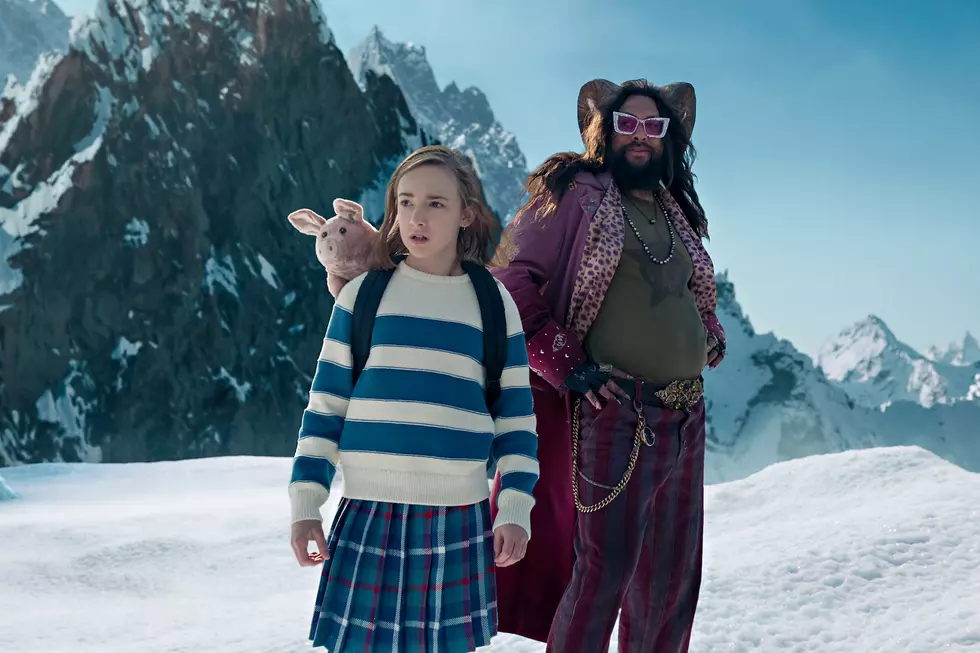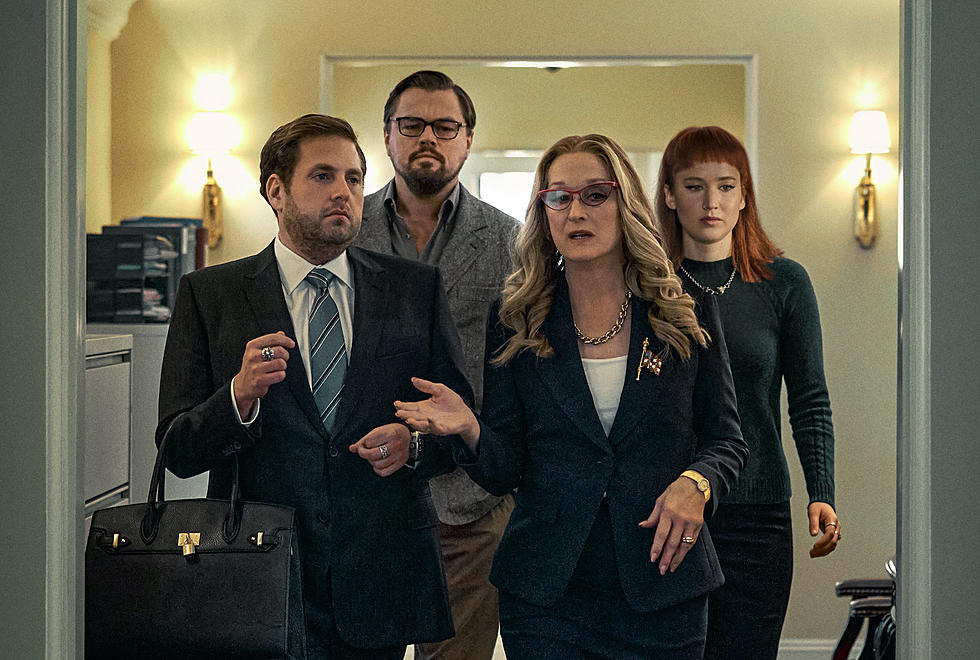
Director Francis Lawrence on ‘The Hunger Games: Mockingjay – Part 1’ and the Legacy of Philip Seymour Hoffman
Francis Lawrence, the director of three out of the four ‘Hunger Games’ movies, gets emotional when the subject of Philip Seymour Hoffman is discussed. It’s not so much grief at this point (it’s been over nine months since the actor’s death), but it’s more from a sense of duty. Hoffman, outside of his role in ‘Mission: Impossible III,’ wasn’t an actor who was known for appearing in huge blockbuster franchises, yet, the last two ‘Hunger Games’ movies will be his last two films. And Lawrence, understandably, feels like it’s on him to make sure Hoffman’s final performances live up to the actor’s profound legacy. Lawrence’s voice cracks while he’s telling me this.
The latest ‘Hunger Games’ movie—somewhat a mouthful with ‘The Hunger Games: Mockingjay - Part 1’—is Lawrence’s second (after his well-received adaptation of ‘Catching Fire’) and the first of a two-part adaptation of the final book in the series. It’s a different feel: The games themselves are long gone, and Katniss Everdeen (Jennifer Lawrence) finds herself as the focal point of a rebel propaganda campaign against President Snow (Donald Sutherland)—who himself is using a brainwashed Peeta Mellark (Josh Hutcherson) against Katniss. So, in a way, there are still games, but the games of ‘Mockingjay’ are a series of mind games between Katniss and Snow, culminating in, well, whatever we will see in the next film.
And this was the challenge for Francis Lawrence, to make a movie that is essentially the first half of a full story. And, yes, there is a lot of setup, but it also gave the director a chance to open up this world—a world we have heard a lot about, but haven’t really seen yet. And a big debate was when the film should end—Lawrence is a big fan of the ‘Breaking Bad’ cliffhanger style of ending—but even Lawrence felt the original ending would leave people too angry.
‘Mockingjay - Part 1’ ends in yet another ‘Breaking Bad’-type ending. You told me last year ‘Breaking Bad’ inspired you.
I said that?
Yes.
I did say that. Yes, we did. We did tweak it and it ends a little differently than it ended in the script.
How did the script end?
Oh, I don’t want to give it away.
But it changed, so it won't give it away.
Well, it will. I don’t want to give that away. I guess we’ll say it ended a little earlier. It was even more of a ‘Breaking Bad’ ending. I felt like it would make people angry—because they don’t have to wait a week, they have to wait a year.
People can handle it. We’d wait a year in-between season cliffhangers.
That’s true, I guess. No, I’m actually very happy with the way this movie ends.
When ‘Mockingjay - Part 2’ comes out, it will be about a month before the next ‘Star Wars.’ That’s going to be quite the cultural collision.
It’s very cool.
For people. Maybe not for you.
I mean, look, absolutely. I’m super excited. I guess I sort of pull myself out of it because I work on them. Obviously I don’t look forward to seeing ‘The Hunger Games’ because I see them thousands of times, but I am so looking forward to J.J.’s ‘Star Wars.’
With ‘Mockingjay,’ did you feel more freedom than ‘Catching Fire’? In that you aren’t replacing another director this time and picking up where he left off?
No. I have to say, from the moment I had my first meeting, I had read the books, loved the books, loved the material, saw the first movie, liked the first movie, came in—it was all happening really fast. So there was no time for me to get nervous, all I could do was be as honest as possible… I wasn’t too concerned, but, I will say, part of the reason I took the job in the first place is the stories are great, but even in ‘Catching Fire,’ there are structural similarities, but there was a lot of room for growth.
Is it difficult doing just one half of story?
No. Very early on, the idea to split the book was already done before I was asked to do them. And part of the reason the book was split into two was that everybody knew there were two distinct stories in there we could tell. Adaptations are always a challenge, but it wasn’t more of a challenge because it was split.
For some ‘Hunger Games’ fans, this is their least favorite book.
I’m not quite sure why…
There’s the structure of the games in the first two books.
They do get used to it and you don’t have that this time around. I think that’s true. I also think that we get into tougher thematic and more sophisticated kind of ideas in this one. And it’s the book where things change and there are some tough things that happen in this book and I think that’s harder for some people.
Last year you mentioned some of the high jinks that occurred because you and Jennifer Lawrence have the same last name. Did that continue?
There are always Lawrence-Lawrence jokes. The only thing that was sort of similar, pretty much every article where Jen and I are mentioned, next to my name you’ll find “no relation.” The “no relation” thing has caught on very quickly and one day at editorial, I pulled into my parking spot and the sign above my parking spot said “Francis Lawrence No Relation.”
When Jennifer Lawrence was on Letterman, she mentioned how upset she was because you made her sing in this movie.
Look, if she actually sang and, for whatever reason, it made you want to cringe and was god-awful, what I would have done was I would have found people who could sing that are voice-alikes. I would have done some trickery.
Like Marty McFly singing ‘Johnny B. Goode’ in ‘Back to the Future.’
Yeah, something like that, exactly. But her voice could not have been more perfect for it. We needed it to sound like a real girl singing and basically staying in tune. Right?
It’s nice.
It’s very nice. I knew from hearing that first recording it was going to totally work. And she was uncomfortable with it… but it’s a real girl singing and she has a real texture to her voice. She can hold a note. It was perfect. And she was feeling very vulnerable that day; she doesn’t like to sing in front of a bunch of people—at least in an emotional, raw, real way. Then she’ll sing Lorde’s ‘Royals’ all the time in front of anybody, but being sort of goofy. But when she thinks she’s supposed to be singing for real, she got very nervous. But, she knew she was going to do it, she was just unhappy about it.
Is ‘Mockingjay - Part 2’ finished?
We have one scene we didn’t shoot that we need to shoot. We had a very, very cold winter in Atlanta and we didn’t get a full spring so the location that I needed wasn’t quite green and lush enough that we need to go back.
When you’re filming the conclusion, do you consider changing anything to keep people on their toes?
Well, things are changed in ‘Part 1,’ but we’re not really changing the story. We’re staying true to the books, but what we’ve done is some world expansion. If you look at the rescue in ‘Mockingjay - Part 1,’ the rescue was something that was mentioned in the book. So, that rescue is really expanded out. We had to really craft a rescue mission. So, what I like is that’s actually exciting for fans of the book. So that will be surprising for people who know the stories.
Even compared to the first movie, which is confined to the arena, the world seems to open up more in this movie.
That was actually one of the biggest challenges with adapting this part of the book. This first half of the book was very internal, but it’s the very beginnings of the revolution. And we had to really figure out a way of making the revolution cinematic and not just people telling Katniss about it—not just hearing people talk about, “Oh, they’re fighting over in that district.” You need to see it. Cinema is a visual medium and you want to see it.
Now that ‘The Hunger Games’ is winding down, what do you want to do next? Are the scripts piling up? Are you now in a position where you can do almost anything you want?
I wouldn’t say that. Quite honestly, I’ve been in ‘The Hunger Games’ bubble for a really long time and I cleared the slate of development when I took on these sequels, because I was basically gone for three and a half years. Only when the editing started to finalize on ‘Part 1’ and coming up for a little bit of air have I started to even think about it. So I’m just starting to think now and read and see what’s out there. Because, you know, it’s time.
What type of movie would appeal to you?
It’s all about story for me.
You’ve been in this dystopian world for quite some time.
Probably, yeah—I would say probably say something “not dystopian” would be good. But it doesn’t have to be small; it doesn’t have to be big. It’s really just about story and characters.
I didn’t know how I’d react to seeing Philip Seymour Hoffman on screen again. I found myself happy to see him. I can’t even imagine what that’s like for you.
Yeah, I mean [pauses], it was really hard. We primarily shot ‘Part 1’ upfront because we had to turn the movie around so quickly. So I worked a lot harder while shooting—I was in the edit room a lot more than I usually am because we kind of had to keep up in a different sort of way. So, what was hard was getting into those scenes so soon after his death. It was really hard. I mean, now, I’m sort of conditioned and I’m used to the movie and I don’t associate those feelings quite as much anymore. But, when you’re going seven days later, I would go into the edit room on Sundays usually thinking, It’s now a week later and I have to go in. And you’re looking at a scene with Phil and Julianne; that was really difficult. And really difficult for me, quite honestly, seeing the moments in takes sort of before and after—before, when you’re seeing Phil and not seeing Plutarch. That was pretty rough. But, now, I see Plutarch and I see the story. It took some time. It’s probably different for the actors if you talk to them about it, because they’re not looking at the dailys and they’re not looking at cuts over a long period of time. It’s an event that happened and now they see him again up on the screen months later.
As a viewer, it almost felt like a gift that we get something else.
Yeah. I do have to say, I oddly felt this sort of responsibility. I mean [pauses], that it’s his last movie. You know, he’s such a good actor. I just hope that we do him justice.
Mike Ryan has written for The Huffington Post, Wired, Vanity Fair and GQ. He is the senior editor of ScreenCrush. You can contact him directly on Twitter.
More From ScreenCrush









